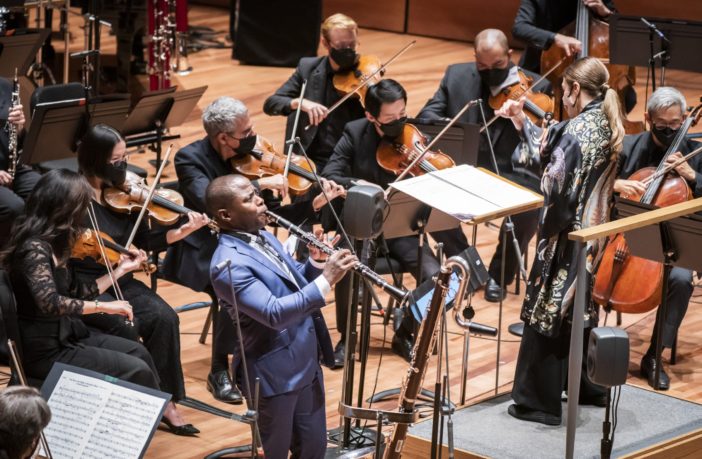I first heard Metropolitan Opera tenor and Broadway actor Christian Mark Gibbs singing as a Black cowboy in the stellar all-Black production of the classic musical “Oklahoma” back in 2018 at the Denver Center for the Performing Arts. Next time I heard him, we were on the same bill, in separate one-act operas for Washington National Opera’s “Written in Stone.”
Gibbs was dazzling audiences nightly in multiple roles: BKLYN in Carlos Simon’s “It All Falls Down” and Grady Mitchell in Huang Ro’s “The Rift.” Now he is in the Tony Award-nominated music revival “Camelot.”
Born in Brooklyn and raised in Queens, Gibbs is the epitome of the singing actor and on-camera hybrid with seamless range. “I am a classical musician, yes, but there are subgenres to every genre,” he explained. “There is pop—but there is also K Pop. And people can get stuck choosing one lane instead of embracing many.”
Must one depart from the classical arts to be diverse?
“Well, [in opera]we are singing in different languages and cultures, so I bring my human experience to my work,” he said when asked about being an artist in 2023. “You have to learn how to be a human first.”
Last month, maestro Malcolm Merriweather conducted an English translation of Bach’s “St. John’s Passion” featuring operatic tenor and Harlem native Noah Stewart, in the storyteller’s role of the Evangelist.
“I am inspired…and I can’t wait to experience what might be another Renaissance in Harlem. Audiences are eager to see, hear, and feel the magic of live performances again.” His output this season included roles new to him but not new to the canon, including tragic heroes Alfredo, Violetta’s romantic lover in 1853’s “La Traviata,” and Tony, the star-crossed lover of Maria in 1957’s “West Side Story.”
An artist’s debuts also shape the classical scene, hearkening back to Tania León’s leveler, “who gets to be on stage,” because even beyond the complex infrastructural detail of getting cast, it falls on working artists to reimagine themselves.
RELATED: Classical conversations, Part 1
Prolific Los Angeles-based film composer Kris Bowers earned a Daytime Emmy scoring “The Snowy Day,” a television special adapting Ezra Jack Keats’ classic.
He scored “Chevalier, which recounts the extraordinary life of 18th-century French-Creole composer-violinist Joseph Bologne, Chevalier de Saint-Georges, and the upcoming “The Color Purple,” plus films “Respect,” “King Richard,” and “Bad Hair,” and television’s “Dear White People,” “When They See Us,” and “Raising Dion,” to name a few. He then composed the original score for Netflix’s “Bridgerton” series and prequel, “Queen Charlotte.”
The queen represents “defiance and individuality,” he said. “She’s trying to refine her voice in a space that is trying to contain her.”
Bowers admitted he didn’t fall in love with classical music until attending college, which is also where he met the writings of James Baldwin, with “a mix of disappointment and deep appreciation that no one ever made me read this before, because coming to Baldwin on my own felt personal. It spoke to me in a different way.”
Orchestration is Bowers’s personal way of “spreading the music through the instruments of the orchestra,” craving what he calls a “visceral moment” with his characters. “The only way I know how to express how I feel about what I’m watching is through music. I can’t really express myself verbally in a way that allows me to release what I’m feeling cathartically. Music is the way that I’m processing. It’s why I love this job so much.”
Harlem is home to Monica Ellis, the bassoonist and executive director of Imani Winds.
“As a Harlemite and touring musician for over 25 years, I take the energy and essence everywhere I go,” she said. “I’m a Black woman, a proud mom, a bassoonist and founding member of the Grammy-nominated ensemble Imani Winds, a teacher, an executive, an entrepreneur. All these things make up who I am and inform the work I do.”
Ellis’s take on classical music is that it is vibrant, new, and alive. She takes pride in “uplifting Black excellence through classical music,” adding, “it belongs to ALL OF US!”
Yolanda Wyns, chair of music at the Harlem School of the Arts, has a lot to celebrate.
Her partnership with the Metropolitan Opera earned her students a masterclass and chorus workshop with history-making musician Terence Blanchard, composer of “Fire Shut Up in My Bones” and “Champion.” Students also met with opera stars tenor Lawrence Brownlee and soprano Erin Morely as they prepared Mozart’s “The Magic Flute.”
Wyns’s process frames each child as a star and p. Pupil Walter Russell lll won a Grammy for his performance last season in “Fire Shut Up In My Bones as Young Charles.” He is currently starring on Broadway in “MJ the Musical.” His performances in these two productions were among two of the most profound theatrical moments I witnessed last year.
Adding to Harlem School of the Arts’ fame, vocalist Wè Ani McDonald soared into the Top 5 on Season 21 of “American Idol” this year.
“My life’s work at Harlem School of the Arts follows the mission of its founder Dorothy Maynor, a critically acclaimed soprano, who started HSA during the Civil Rights Movement,” said Wyns. “[At that time] she had no rights as a woman of color. She could not sing at The Met or any venue in the United States [but]she later became the first woman of color to be on the Board of the Metropolitan Opera. Her vision was to expose brown boys and girls to excellence in the arts. My personal mission has been to expose my students to people in the arts who look like them; who are doing great work as composers, musicians, and singers; who are bringing beauty to the community.”
Anthony McGill is principal clarinet with the New York Philharmonic—and the first African American principal player in the organization’s history.
“Playing in the New York Philharmonic is a great honor. I have a serious responsibility to perform at the highest possible level artistically and to use my position for good in the world. I was [once]a young man growing up in Chicago without very many mentors that looked like me…Demarre McGill [principal flutist at Seattle Symphony]showed me what was possible through music.”
One important lesson McGill remembers came from his high school teacher, Richard Hawkins. He told McGill, “Every day, there is a clarinetist born who is ‘better’ than you, so you always need to work hard and not worry about any kind of competition.’ Time has already cast our replacements. All we really control is how we choose to manifest our gifts in the present.”
With the Vienna Radio Symphony and Marin Alsop, McGill recently recorded a concerto written for him by Syrian American composer Malek Jandali that is dedicated to all victims of injustice everywhere. In themes familiar to working musicians everywhere, and certainly in the refrains of the artists and composers in this article, I’m hearing a steady plea to refocus on the Self.
McGill added, “The most important thing in my mind to tell a young musician is to listen and play music with sincere, authentic purpose.”
We work hard to bring audiences ever-new takes on the myths and fairy tales, and sometimes painful histories, that shape our everyday lives. Musicians work to perfect the unique ways they transmit the agony or rejoicing to an audience in the course of a single show, and they do this on repeat, day in and day out, year after year.
“Always be curious and never stop learning and growing,” McGill advised.
We burrow into our practice rooms and our manuscripts, our books and our relationships, to ease the growing pains and celebrate the enormous world of music that we get to connect to. When you come to a concert, take in a show or a film, attend the opera or the ballet or another dance form; when you watch a film, listen to the score on television, you might just be joining us where we live. Classical music has always been changing and evolving, and so, with certainty, we will be here when you stop by. We’ll be here. That is what we do across the centuries. We be.
Alicia Hall Moran is a Harlem resident, classical mezzo soprano, conceptual vocal artist, and former AmNews classical music columnist for “Suite Sounds.”
*Dedicated in loving memory of Raoul Abdul.
Like this:
Like Loading…



